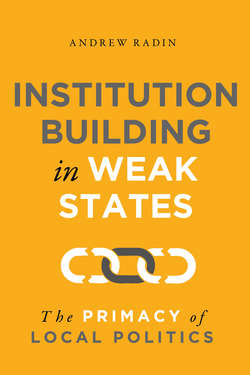Читать книгу Institution Building in Weak States - Andrew Radin - Страница 25
На сайте Литреса книга снята с продажи.
PREDICTIONS FOR REFORMS THREATENING NEITHER OR BOTH NATIONALIST GOALS OR PATRON-CLIENT NETWORKS
ОглавлениеSome reform efforts may pose a threat to neither nationalist goals nor patron-client networks. In such cases, the theory predicts that foreign actors will be able to improve state institutions depending on the resources they possess, following the international resource theory described below (Hypothesis 3). Table 2.4 outlines the process hypotheses for reforms threatening neither and both nationalist goals and patron-client networks.
Without a threat to nationalist goals or patron-client networks, the theory expects that elites and the mass population will generally support reform and will not engage in significant public or private opposition (Hypothesis 3A). As in the case of reform threating patron-client networks, the theory expects general public support for reform (Hypothesis 3B). Greater international resources are expected to enable greater improvement in the state institution, according to the techniques suggested by the international resource theory (Hypothesis 3C). Still, the absence of a good reason to oppose reform does not necessarily mean that elites and bureaucracies will take positive action to implement it. Ruling elites may still engage in limited private opposition even in the absence of a significant threat to their networks, but their opposition is likely to be less intense than if these networks were under major threat (Hypothesis 3D).
TABLE 2.4. Hypotheses for Reforms Threatening Neither and Both Key Interests
| Threat of demands or recommendations to domestic interests | Outcome | Process |
| No threat to nationalist goals or ruling elites’ patron-client networks | H3: The international resource theory applies—greater resources will lead to more improvement. | H3A: There will be limited systematic public or private opposition. H3B: Public opinion is expected to support or not strongly oppose reform. H3C: Higher international resources will enable greater improvement, according to the techniques suggested by the international resource theory. H3D: Elites may engage in low-level private obstruction to protect interests absent a threat to their networks, but it will be of lower intensity. |
| H3E: If significant private or public opposition does emerge, it will limit reform as predicted by H1 and H2. H3F: Reforms that do not identify changes that improve the effectiveness, accountability, or rule of law of a state institution will achieve little improvement. | ||
| Threat to both nationalist goals and ruling elites’ patron-client networks | H4: No improvement in state institutions. | H4A: Public opposition is most likely because it is most effective, but private opposition is also possible. |
The specific politics of particular countries vary, and there may be significant private or public opposition even in the absence of threatening demands or recommendations. If such unpredicted public or private opposition occurs, the theory expects opposition to limit reform as these hypotheses predict: widespread and recurring public opposition should block reform, and private opposition should limit reform depending on the available international resources (Hypothesis 3E).
One possibility is that avoiding targeting nationalist goals and patron-client networks will water down reform efforts and prevent meaningful changes in the relevant state institutions. When foreign demands or recommendations do not specify changes that will make a meaningful impact on the effectiveness, accountability, or rule of law of a state institution, the theory expects that the institution will not improve (Hypothesis 3F).
Alternately, a reform effort could pose a threat both to nationalist goals and to the ruling elites’ patron-client networks. If this occurs, the theory expects that reform will fail (Hypothesis 4). The theory expects that failure resulting from public opposition is most likely since elites will prefer to use the most effective means to block reform—namely, rallying public demonstrations through elites’ objections. Still, elites may also attempt to prevent reform through private opposition (Hypothesis 4A).
